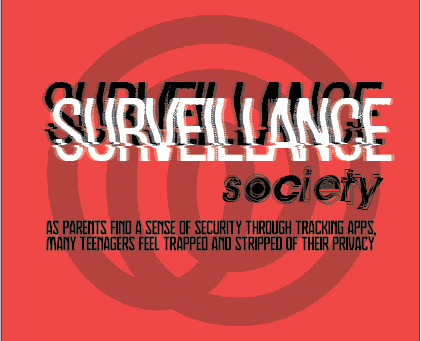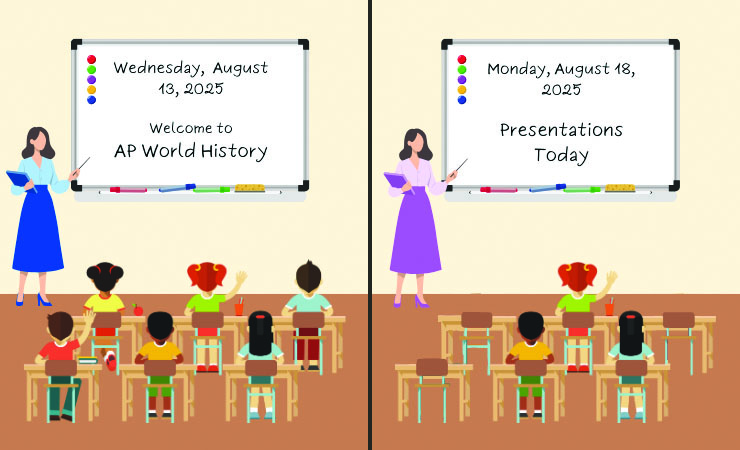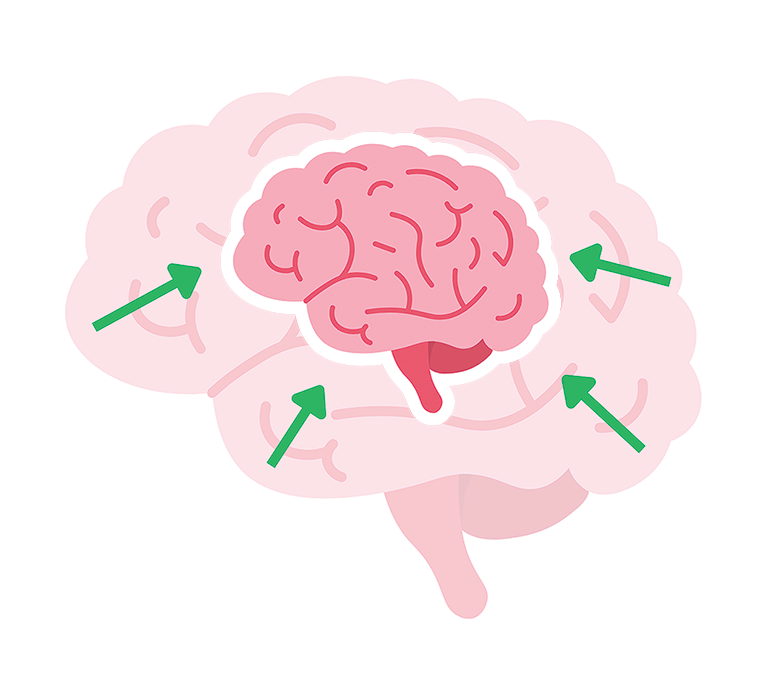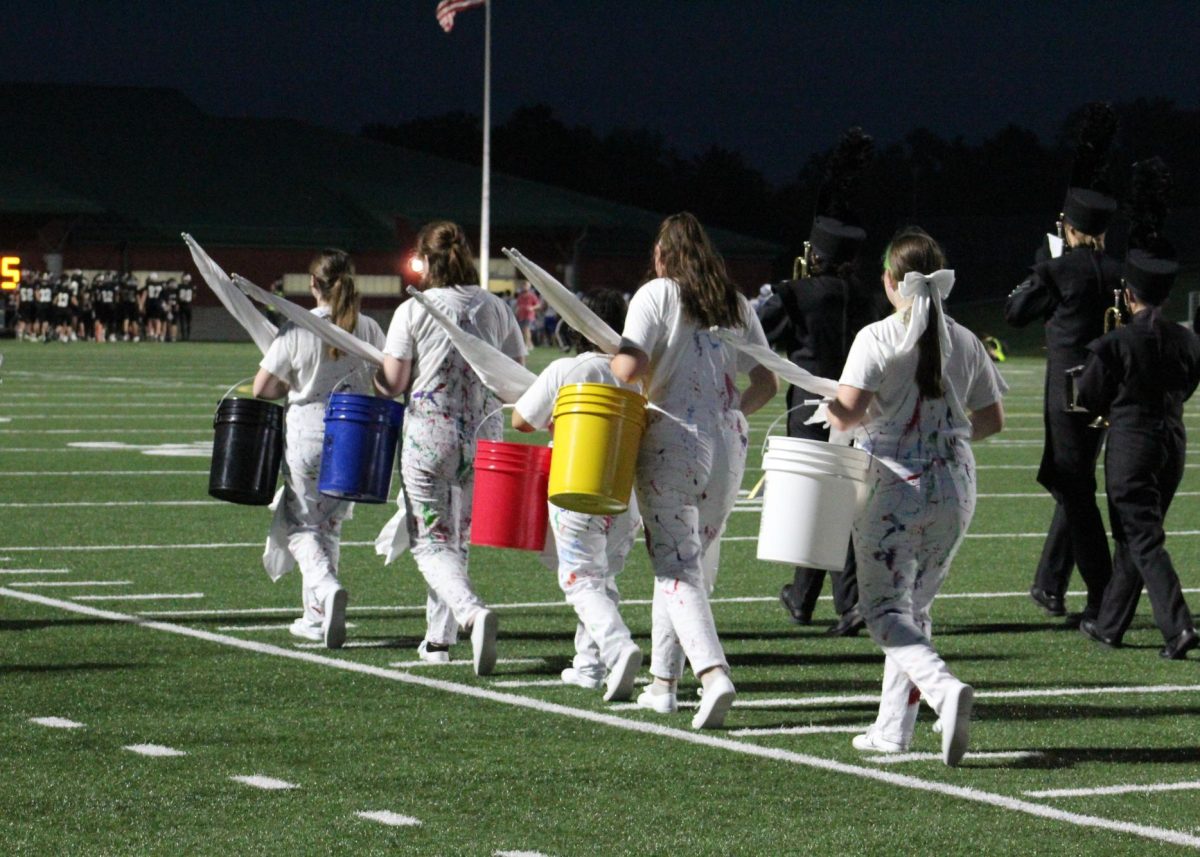Surveillance Society: As parents find a sense of security through tracking apps, many teenagers feel trapped and stripped of their privacy

March 3, 2020
It’s a Saturday night and you’re picking up your friends and going to a movie. On the way to pick them up, your phone dies while you’re driving in their neighborhood. Normally this wouldn’t be an issue; You’d ask for a changer and charge your phone in the car or when you get home. But your parents have Life360. They see that your phone died and your last known location is by a house they aren’t familiar with, not at the movie theater where you had said you’d be. Your parents assume the worst, and when you get home, they’re waiting with a meticulously planned lecture and punishment. Not only are you grounded, but your parents have lost a lot of their trust in you, solely because of a mistake made by an app.
According to a study conducted by Asurion, a technology company and blog, 75 percent of 2,000 parents with a teenager use technology ranging from apps on their phones to security cameras in order to monitor their children’s activity.
Not only is it at home that technology is being used to monitor, but many schools have implemented digital systems like Synergy, which currently serves 5,600 schools, including Lincoln Public Schools (LPS). This program allows parents to log in and immediately see their children’s grades, attendance, GPA and many other aspects of their school life. While many of these programs have made students’ and parents’ lives easier, many teenagers feel that it may cause more stress than it’s worth.
Sophomore Adalia Maiyo resonates highly with that pressure.
“If my dad checks and sees a 91 [percent], he says I need to get it up, even though it’s an A,” Maiyo said.
Maiyo explains that these lectures about always needing to do better have made her feel like she can’t talk to or even trust her parents as much as she used to.
Many other adolescents share the same feelings as Maiyo in regards to their parents digitally monitoring them. The video-sharing social media app, TikTok, has become a popular place for teens to not only share their experiences with followers, but also share ways to evade the GPS tracking, Life360 and similar apps. The hashtag #Life360 has more than 83.8 million views, and a video posted to this hashtag explaining how to get around the GPS tracking on Life360 has more than 1.8 million likes.
Life360 has become the most popular app to receive such extreme backlash from its teenage subjects. This may be due to the fact that the app does so much more than just track the user’s location. Life360 has a free version, and a paid version, which opens up more advanced services like driver reports and crash detection. Driver reports send messages and alerts to other party members about how fast the subject is driving, whether they are using their phone while driving or even braking too hard. It is also possible to view when a user last used their phone, all their previous locations and what percentage the user’s phone is at.
Features like crash detection and 911 contact can make parents feel better about their new teen drivers, and possibly reassure teens that they have another layer of protection on the roads. But some of the drive-based features have amassed notoriety after giving inaccurate speed and break reports. This has led to teens getting unwarranted lectures or even grounded over something that they didn’t do, which had been falsely reported to parents through the Life360 app.
A popular TikTok creator that makes content regarding parenting on the social media platform is Samantha Howsden, who has been on the “For You” page (a feed that features popular creators and videos pulled algorithmically for the specific user) multiple times and has also amassed more than 1.8 million likes on one of her videos regarding Life360. Howsden is a mother of two teenagers, and uses her parental experience to offer an angle that a lot of teens cannot provide in regards to their own parents. Many teens enjoy following her, as she is known for saying what they want to say to their parents, but can’t due to the fear of their parents’ response.
“All Life360 does is create total neurosis in our kids, and teaches them how to be sneaky. Give up Life360; it is not accomplishing what you think,” Howsden said in one of her videos she posted to her TikTok account.
The point she makes in that video reinforces how much stress is really put on teens when they know that their parents could potentially be watching them whenever they aren’t at home. Her video explains a fear of confrontation and punishment in teenagers, rather than just reinforcing the expectations.
A second point Howsden discusses often on her account is the fact that when a parent is tracking their child’s phone, it is easy for that child to drop their phone off at a friend’s house and do whatever they want to do without their parents knowing. Not only does this then defeat the whole purpose and reasoning behind having the app, but it also puts the teen in a lot more danger.
“They’re not safe. [You’ve] created a situation where they could possibly go someplace dangerous, need a phone and they don’t have one,” Howsden said.
While there have been many recent technological advances to supposedly keep a parent’s child “safer” emerging, it is also important to note that today’s teenagers have been taking less risks already, even without Life360. According to Pew Research Center, the teen birth rate has been on the decline since the baby boom and is currently at a record-low, along with teen drug abuse (besides marijuana use that remains relatively steady) and high school drop-out rates. This shows that now, more than ever, teens have been making good choices, and these indicators of teenage life and safety have been changing for the better, long before parental-control apps were brought to the market.
If teens are truly becoming better decision makers than their parents were when they were teens, it begs the question, “Is all of this monitoring and harping on teenagers necessary or healthy?” No matter what side students stand on, it is widely acknowledged that trust is the most important thing within parental relationships, but many students at Lincoln Southeast High School feel that these invasive apps are not the way to go about building it.









